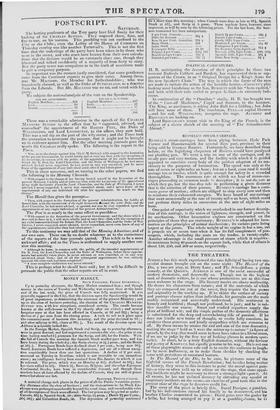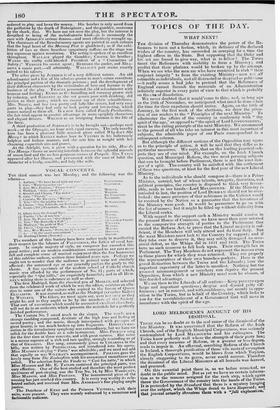THE THEATRES.
JERROLD has this week experienced the rare felicityof having two sue. cessful dramas brought out on the same night : The Hazard el the Die, a two act play, at Drury Lane ; and The Schoolfellows, a petite comedy, at the Queen's. JERROLD is one of the most successful of modern dramatists, and deservedly so. Though not in the highest rank of dramatic writers, be is one whose productions are at this time most welcome to the stage. His literary merits are above mediocrity.. Ile draws his characters from nature ; and if the materials of which they are composed are not of the rarest, they require the less power and originality in the working up. If he skims the surface of society and portrays classes rather than individuals, his portraits are the more readily recognized and universally understood. His sentiment is homely and healthful ; though not profound, he is just; and he is nei- ther maudlin nor coarse. Smart and studied repartees supply the place of brilliant wit; and the simple pathos of the domestic affections is substituted for the deep and overwhelming tide of passion. If he does not kindle new trains of thought, or excite lofty emotions, be awakens those generous and kindly sympathies which are common to all. By these means he attains the end and aim of the true dramatist; making the stage " hold as 't were the mirror up to nature" (a figure of speech, by the way, that would seem to have been taken in a literal sense, if we are to judge by the free use of looking-glasses in modern spec- tacle). In short, he is a truly English dramatist, without the fervour and poetry of KNOWLES, but equally genuine in his way. He isnot one of those playwrights whose sole end is to excite the audience to laugh- ter by mere buffoonery, or to make them shudder by shocking the sense with gratuitous or unnatural horrors.
In The Hazard ty* the Die, to be sure, be pictures some of the frightful scenes of the French Revolution ; but besides being matter
of history, they serve in this instance to point the moral against gam- ing—a vice so often held up to odium on the stage, that some appal- ling incidents might be necessary to throw a stronger light upon it. At
all events, he has not violated decency by obtruding any squalid or sanguinary incidents on the scene—an exercise of good taste that in the present state of the stage he deserves credit for. The story of the piece is briefly this. David Duvigne, a gambler, had by his indiscretions caused his family to be denounced, and his brother Charles committed to prison : David gains over the gaoler by a bribe, but having arranged to pay it at a gambling-house, he is seduced to play, and loses the money. His brother is only saved from the guillotine by the death of Robespierre ; and the gambler, overcome by the shock, dies. We have not yet seen the play, but the interest is described as being of the melodramatic kind—as is commonly the case with JERROLD'S serious dramas—and most effectively wrought up. The characters of the Revolutionary agents are painted in such colours that the loyal heart of the Morning Post is gladdened ; as if the exhi- bition of two or three heartless sanguinary ruffians on the stage was any argument against revolution. The acting is spoken of as excellent throughout. WALLACK played the Gambler; CoorEa his brother; WARDE the crafty cold-blooded President of a " Committee of Safety ;" WEssrEit his secret agent ; BEDFORD the gaoler, and MEA- DOWS a comic part,—all admirably. WALLACE'S part seems exactly suited to his talents.
The other piece by JERROLD is of a very different nature. An old schoolmaster and a few of his scholars grown to man's estate constitute the principal portion of the dramatis persona:; and the development of their different characters by the vicissitudes of love and fortune is the business of the play. Tit.auny personated the old schoolmaster with humour and feeling; ELTON as th3 foundling and runaway grown rich by industry, and BARNETT as the sot grown poor with drinking, did justice to their parts ; which we cannot say of their schoolfellows. Mrs. NISBET, and her two pretty and lady-like sisters, had very easy parts to play—they bad only to look pretty and interesting, which comes natural to them all. In a new farce culled Family Peculiarities, the fair triad appear to greater advantage in more sprightly characters and elegant dresses. WitENcit as an intriguing footman is the life of the farce.
A third production of JEanoLD's is to be brought out—perhaps next week—at the Olympic, we hope with equal success. The only novelty here has been a pleasant little musical piece called Why don't She Marry? in which KEELEY makes love to VESTR1S in his ludicrously helpless and forlorn manner, and she sets him at nought with her charming coquettish airs and graces.
At the Adelphi, too, a piece with a question for its title, How do You Manage? forms an amusing interlude between the splendid marvels of moon-land and the no less gorgeous scenes of Pompeii. Mrs. YATES appeared after her illness, and personated with the ease of habit the character of a lively, sensible, and lady-like wife.

























 Previous page
Previous page